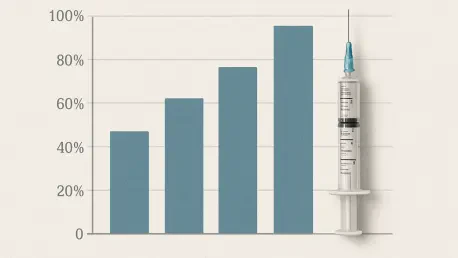In a startling simulation of a potential public health crisis, researchers have highlighted the grave dangers posed by declining vaccination rates in Florida, particularly in the context of a possible measles outbreak that could affect thousands. Leon County serves as a focal point in this alarming scenario, where even a small drop in immunization levels could lead to a significant number of cases in a short span. This concern stems from sophisticated modeling that underscores the fragility of community protection, often referred to as herd immunity, when fewer individuals are vaccinated. As debates over vaccine mandates intensify across the state, the tension between scientific evidence and personal choice has come to the forefront. With Florida at a critical juncture, the implications of reduced vaccination coverage could ripple far beyond local communities, posing a significant threat to public health on a broader scale. This situation demands attention to the delicate balance of policy, science, and societal responsibility in safeguarding against preventable diseases.
Modeling the Threat of Measles Spread
A groundbreaking simulation developed by Mark Roberts, a recently retired professor from the University of Pittsburgh, paints a sobering picture of how quickly measles could spread in Leon County under certain conditions. Using a sophisticated tool known as the Framework for Reconstructing Epidemiological Dynamics, this model incorporates census data and local school district vaccination rates to predict outcomes in a hypothetical scenario. The simulation begins with a single infected student attending school, revealing that a mere 10% decrease in vaccination rates could result in a dramatic surge of cases. Described as a worst-case scenario, this outcome is not the most probable but could occur in roughly 1 out of 20 instances. Notably, the model excludes potential interventions by health officials, focusing solely on the raw impact of vaccination coverage. This stark warning emphasizes how even minor declines in immunization can dismantle the protective barriers that communities rely on to prevent outbreaks of highly contagious diseases.
The implications of this research extend beyond a single county, offering a glimpse into the broader risks facing Florida as a whole. Roberts’ findings suggest that if vaccination rates continue to wane, the state could see thousands of measles cases in a short period during an outbreak. This simulation serves as a critical reminder of the importance of maintaining high immunization levels to ensure community safety. Unlike predictive forecasts, the model acts as a cautionary tool, illustrating potential consequences rather than definitive outcomes. By grounding the data in a local context like Leon County, the research makes the abstract threat of infectious diseases more tangible, highlighting the urgent need for sustained vaccination efforts. As public health officials grapple with these insights, the challenge lies in translating such data into actionable policies that can prevent the devastating scenarios depicted in the simulation, ensuring that communities remain protected against preventable illnesses.
Policy Debates and Public Health Concerns
Amid the scientific warnings, a contrasting perspective emerges from Florida’s Surgeon General, Joseph Ladapo, who advocates for ending school vaccine mandates in favor of parental choice. Ladapo argues that some countries without strict immunization requirements do not experience catastrophic health crises, suggesting that mandates may not be the only path to public safety. This stance has sparked significant debate, as it challenges the conventional public health approach of enforcing vaccinations to maintain herd immunity. While current state law requires measles vaccines for school attendance, there is growing discussion among lawmakers about potentially loosening these requirements as early as next year. Such a policy shift could have profound implications, especially in light of simulations showing the rapid spread of disease with even slight declines in vaccination rates. The clash between individual freedom and collective responsibility remains a central issue in shaping Florida’s public health landscape.
On the other side of the debate, scientific voices like Roberts remain focused on data-driven insights, avoiding political stances while emphasizing the risks of reduced vaccination coverage. The tension between these viewpoints reflects a broader societal struggle over how to balance personal liberties with the need to protect vulnerable populations. High vaccination rates have historically been a cornerstone of preventing outbreaks of diseases like measles, which can spread rapidly in unvaccinated or under-vaccinated communities. As Florida navigates this complex issue, the potential consequences of policy changes loom large, particularly for schools and densely populated areas where transmission risks are heightened. The ongoing discourse underscores the necessity of informed decision-making, where evidence from simulations and historical data must be weighed against philosophical arguments about individual rights, ensuring that public health strategies are both effective and equitable.
Safeguarding Communities Moving Forward
Reflecting on the warnings issued through detailed simulations, it is evident that Florida stands at a pivotal moment in its approach to public health, with the potential for catastrophic measles outbreaks looming. The data-driven insights provide a clear picture of the devastating potential of measles outbreaks when vaccination rates falter, even by a small margin. This realization underscores the critical role that sustained immunization efforts play in protecting communities from preventable diseases. The debate surrounding vaccine mandates, fueled by differing perspectives, highlights the challenges faced in aligning policy with scientific evidence. Looking ahead, the focus shifts to fostering dialogue between policymakers, health experts, and the public to ensure that decisions prioritize community well-being. Strengthening education on the importance of vaccinations and addressing concerns about mandates emerges as a vital step to rebuild trust. Ultimately, the path forward requires a commitment to balancing individual choice with collective safety, ensuring that the lessons learned from past simulations inform future strategies to prevent outbreaks.









